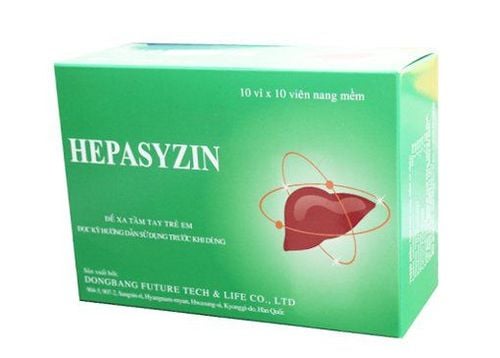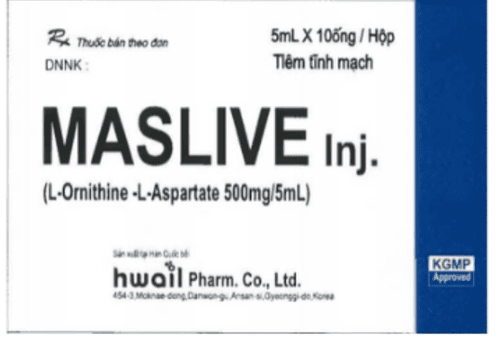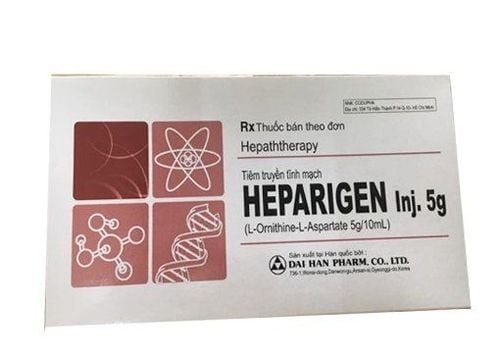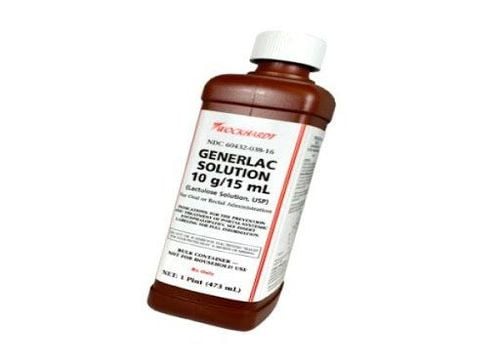This is an automatically translated article.
Heparigen 5g has a protective effect and helps to improve liver function, supporting the treatment of acute and chronic liver diseases. The drug is used by intravenous infusion, should be used in a medical facility. Find out some information about the drug through the article below.
1. Uses of Heparigen 5g
Heparigen is prepared in the form of ampoules containing 10ml, Ingredients in each 10ml tube contain L-ornithin-L-aspartate 5g and water for injection just enough 10ml. In addition, heparigen 500mg is also packaged with the main active ingredient content of L-ornithin-L-aspartate 500mg in a 5ml tube.
L-ornithin-L-aspartate is a stable double salt complex that, when injected into the body, can dissociate to form 2 component amino acids. These two amino acids are the raw materials involved in the urea cycle and the synthesis of Glutamine. These two components participate in the synthesis of liver and body cells from endogenous toxins by:
Enhance urea synthesis, thereby having a detoxifying effect, converting endogenous toxic ammonia into urea without Toxic in liver and brain. Stimulating the formation of Ketoglutarate and Glutamate helps to reduce the concentration of ammonia in the brain. Stimulates energy generation related to the Krebs cycle and stimulates energy transfer between the mitochondrial intercellular matrix and the cytoplasm. Aspartate plays a very important role in the synthesis of purines and pyrimidines, helping to regenerate nucleic acids in damaged liver cells.
2. Indications and contraindications of Heparigen 5g
2.1.Indications for Heparigen Inj. 5g is indicated for supportive treatment in cases of acute liver disease, chronic liver disease such as hepatitis, cirrhosis... especially in the case of hepatic coma or hepatic pre-coma.
2.2.Contraindications Heparigen 5g should not be used in the following cases:
Hypersensitivity to any ingredient of the drug. Severe renal failure when creatinine clearance is less than 20 ml/min. The patient has lactic acidosis, methanol intoxication, deficiency of the enzyme Fructose-1,6-diphosphatase.
3. How to use and dose of Heparigen 5g
How to use: The drug is administered through a slow intravenous infusion. The intravenous infusion is carried out by medical personnel.
Dosage: Dosage depends on each specific patient, can refer to the following dose:
Acute hepatitis: Take 1-2 ampoules (equivalent to 10-20ml) per day. Chronic hepatitis or cirrhosis: Dosage is 2-4 ampoules (equivalent to 20-40ml) per day. Dosage may be increased in severe cases such as:
Hepatic coma and hepatic pre-coma: Use with starting dose not to exceed 20 ampoules (200ml) per day, choose dose according to symptoms of disease. Severe cases can be infused with 8 ampoules (80ml) within the first 6 hours. Then at the next 18 hours, every 6 hours, proceed to slow infusion 4 more tubes (40ml). Treatment of overdose:
Overdose: An overdose of aspartic acid can cause neurological damage. The drug is potentially toxic when used in large doses. However, no overdose cases have been reported to date. Therefore, if a patient overdoses and shows unusual symptoms, it is necessary to immediately bring the patient to the nearest medical facility for timely treatment.
4. Undesirable effects of the drug Heparigen 5g
In the process of taking the drug, if the patient takes the correct dose, there are rarely side effects. Some less common side effects include: Nausea, burning sensation in the larynx. Usually, treatment with Heparigen 5g should not be discontinued if these side effects occur, as they will go away once the medication is stopped.
There may be other side effects, so if the patient has any unusual symptoms, it is necessary to immediately notify the doctor for advice and timely treatment.
5. Things to keep in mind when taking Heparigen 5g
Before injecting, the medical staff need to check the injection solution, has an abnormal color or not.
Use caution when using Heparigen 5g in the following cases:
Use in children: Due to insufficient data, high doses are not recommended for children. Use of Heparigen 5g in pregnant women and lactating women: Currently, there are limited data on the use of the drug in pregnant women and nursing mothers. Therefore, carefully weigh the benefits and risks before deciding to take the drug. If it must be used in extreme cases, breast-feeding should be discontinued. If the patient is prescribed a high dose of the drug, the drug concentration in the blood and urine should be regularly checked, and blood urea and urine should be monitored.
Care should be taken when cutting the ampoule to avoid the risk of glass shards mixing with the solution, increasing the risk of dangerous side effects.
When taking medicine, it is necessary to follow the instructions of medical staff, do not arbitrarily adjust the speed of drug infusion, because this drug needs to be infused slowly.
6. Drug interactions
Some drug interactions need attention when using the combination:
Phenothiazines; Co-administration with diuretics that lower blood potassium should be cautious; May be incompatible with acid bases, reducing agents, strong oxidizing agents. Hopefully with the above information you know what Heparigen is, how it works and how to use it. This is a drug indicated in medical facilities to treat acute and chronic liver diseases. When taking medicine, you need to strictly follow the instructions of your doctor and medical staff.
Follow Vinmec International General Hospital website to get more health, nutrition and beauty information to protect the health of yourself and your loved ones in your family.
Please dial HOTLINE for more information or register for an appointment HERE. Download MyVinmec app to make appointments faster and to manage your bookings easily.













